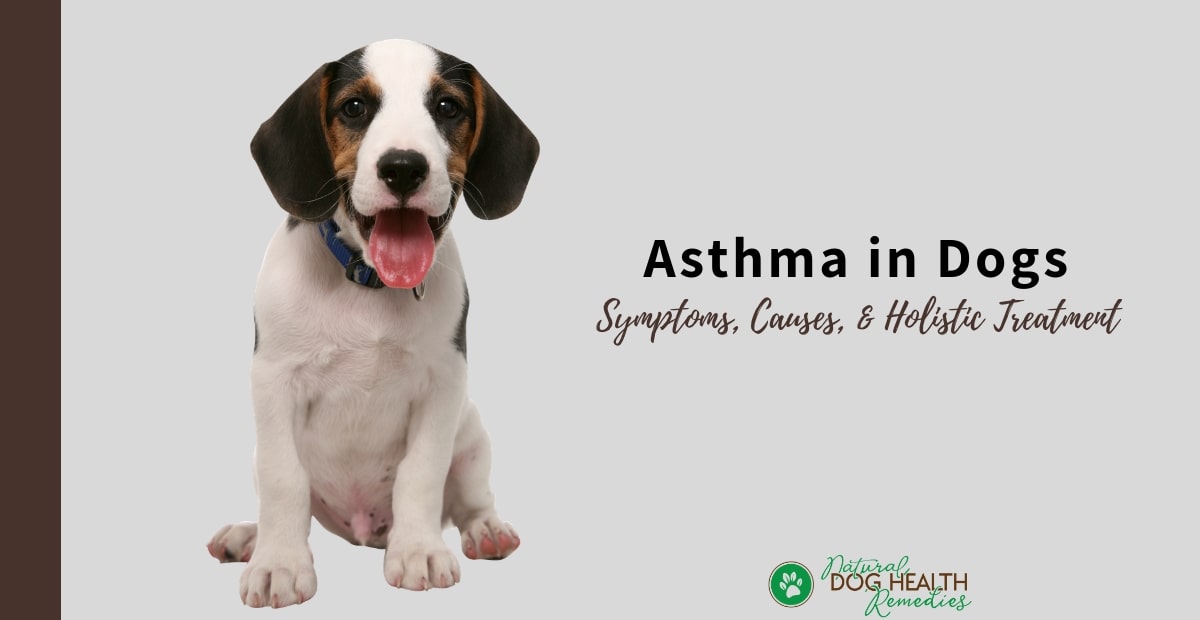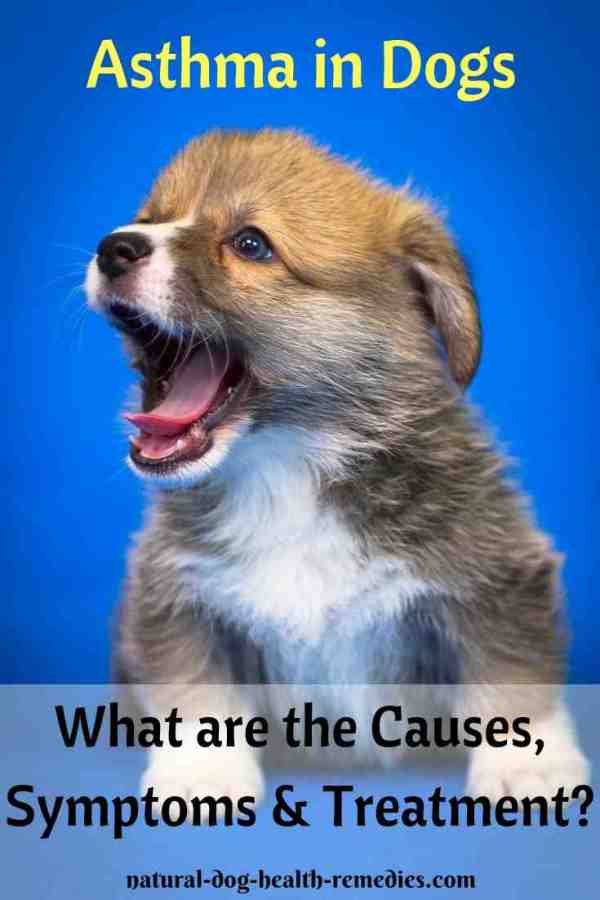Asthma in Dogs

Overview
Have you ever witnessed a dog asthma attack? It is quite scary, really.
A dog with asthma may begin an attack by wheezing and coughing. If the attack is severe, it may then progress to obstructed airways and labored breathing.
Contrary to what many people think, asthma in dogs is not an infectious disease. It is more like an allergic reaction to airborne irritants and pollutants.
Asthma occurs more commonly in middle-aged and older pets, and dogs with weakened immune systems. Read on to find out more about the possible causes, symptoms, and treatment.

Looking for Dog Asthma Natural Remedies?
Click here to visit our page on how to use natural remedies such as herbs to help control asthma attacks in dogs.
What Causes Asthma in Dogs?
As mentioned above, asthma not a disease. It is in reality a symptom which occurs as part of a severe allergic reaction.
Dogs that have weakened immune systems are more prone to allergies and allergic reaction. A dog may have an asthma attack because he is allergic to some airborne irritants, such as cigarette smoke, dust, pollen, or other air pollutants.
Other deeper underlying problems, such as worms, bacterial or viral infections, or even cancers, may also cause asthma in dogs.Certain dog breeds (e.g. pugs, malteses), due to the anatomy of their airways, are more prone to asthma.
What are the Symptoms of Asthma in Dogs?
Two typical symptoms that indicate a dog may have asthma are coughing and wheezing.
The cough can be a dry cough, but sometimes the dog may cough up some phlegm. Coughing is usually triggered by excitement and exercise.
In addition, dogs with asthma also show some of the following signs:
- Sneezing
- Appetite loss
- Lethargy
- Weight loss
- (In extreme cases) Dog's tongue or gums may turn blue
If your dog shows the above symptoms, take him to see the veterinarian as soon as possible for chest x-rays and blood tests in order to make sure that the asthma attack is not secondary to some other underlying problems mentioned above.
Conventional Treatment for Asthma in Dogs
Conventional treatment is usually suppressing the asthma symptoms through the use of prescription drugs. In particular, a dog with asthma will usually be prescribed:
- Antihistamines to counter the allergic reactions that cause asthma.
- Anti-inflammatories to reduce inflammation and swelling in the lungs.
- Bronchodilators to help the dog breathe easier.
How Can You Help a Dog with Asthma?
 Using drugs to suppress the dog asthma symptoms does not do our dog much good if we don't address the underlying cause.
Using drugs to suppress the dog asthma symptoms does not do our dog much good if we don't address the underlying cause.
From a holistic point of view, we should look at what is causing the problem and then take action to deal with that problem.
If your dog's vet has ruled out any deeper underlying diseases, then try doing the following:
- Remove Outside Irritants: Since many dogs develop asthma as a result of being exposed to airborne irritants, it makes sense to eliminate as many irritants that may cause asthma as possible.
Take a look around your house. Are there any irritants (e.g. chemicals from household cleansers, special garden sprays such as pesticide, cigarette smoke) that may cause allergic reactions in your dog? If so, get rid of them! They are probably not too good for your health either!
Also, change air filters in the house regularly so that dust, dander and other airborne allergens can be removed efficiently all the time.
When vacuuming, make sure that your dog is not in the room as this can trigger allergies in sensitive animals.
- Weight Control: Overweight dogs and asthma go hand in hand - obesity is one cause of asthma in dogs. Therefore, give your dog plenty of regular exercise and a healthy diet (no junk food!) to keep down his weight, thus lessening the possibility of asthma attacks.
- Strengthen the Immune System: A strong, healthy, and balanced immune system will also protect the body from having asthma attacks.
- Soothe and Relieve the Symptoms: Asthma dogs are more comfortable in an environment with adequate moisture.
Use a cold-mist humidifier if necessary to make sure that the room where your dog sleeps is not too dry.
If you have a diffuser for aromatherapy, try diffusing a few drops of cedarwood (Juniperus virginiana) and/or eucalyptus (Eucalyptus radiata) essential oils to aid smooth breathing by opening up the respiratory passages. Eucalyptus oil is also antimicrobial.
Eldredge, et al. Dog Owner's Home Veterinary Handbook 4th edition (Wiley Publishing, 2007).
C.J. Puotinen, Natural Remedies for Dogs and Cats (Keats Publishing, 1999).
M. Goldstein, The Nature of Animal Healing (Ballantine Books, 2000).
R.H. Pitcairn, The Complete Guide to Natural Health for Dogs and Cats (Rodale, 2005).





